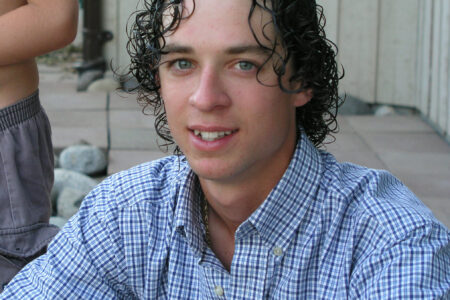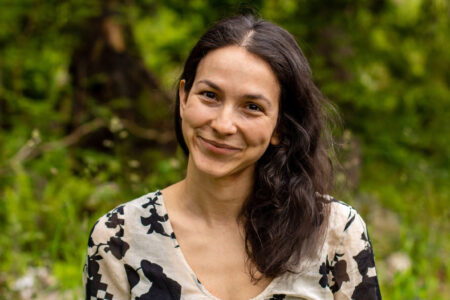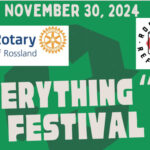COMMENT: A potpourri of points-of-view at a liberally spiced political potluck
MP Alex Atamanenko and his wife Ann joined more than 20 Rosslanders for a potluck on Tuesday evening to discuss Canada under the current Conservative leadership and the strategies concerned Canadians can use to turn our nation in a different (i.e. better, brighter) direction.
Andy Morel’s house was abuzz with moose burgers, quinoa-cranberry salad, Red Mountain goat cheese pizza (thanks Sarah!) and a long list of “issues” people have with the ruling feds.
The discussion ranged from the lack of proportional representation—for example, our majority government despite only minority support—to the sacking of scientists, the bottom line of energy profits at any and all costs, and the proposal to change the Southern Interior riding’s boundaries.
Here we record a few comments made by potluck participants at the gathering. Some comments refer to LeadNow.ca, an online “pro-democracy” advocacy group that is trying to rouse grassroots collective action from coast to coast against what they and others perceive as anti-democratic leanings in Stephen Harper’s leadership.
In a separate article we report on comments made by Atamanenko regarding these topics, from the process of change within political parties and the powerlessness of the opposition against the Conservative agenda—as evidenced by the sweeping omnibus Bill C-38—to Atamanenko’s personal experiences with former NDP leader Jack Layton and the challenges faced by the current NDP leadership.
(Note: Not all participants consented to having their identity released. The order of comments is not chronological. Only selected comments have been reproduced.)
Andy Morel:
“Thanks so much everybody for coming out tonight to our appeal to get bodies and voices and hearts together to talk about some common issues we all have concerns about.”
“And thanks so much to Alex [Atamanenko] for coming along.”
“I know there are many more people who showed interest, who would have liked to be here tonight, but with other commitments, being away and such, were unable to make it.”
“LeadNow people have been sending me information, and I’m getting quite excited about what they’re speaking about. They recently got national press coverage on the omnibus bill, and they seem to be gathering some major momentum across the country, particularly with regards to electoral reform.”
“For me, it’s pretty straightforward what’s wrong with our system when we have a very right-wing government like the Harper Conservatives who are very much calling the shots without a true majority—very much a small minority when you consider the number of votes actually cast.”
“It’s unfortunate we haven’t been able to engage [more] Canadians in our political process. It’s extremely disappointing when barely 60 per cent of Canadians even cast a vote. It goes to show not only the complacency, but the ignorance that’s out there.”
“That plays very much to Mr. Harper’s hand. He wants us to be not only complacent, but ignorant. And that’s very much the Conservative agenda: let’s just keep showing more hockey—we tune out. We don’t want more CBC—it’s too centre, too left for the Conservatives.”
“It disturbs me. Now as a majority government, the acts that they’re able to wield, it’s pretty obvious. With a bill like they just passed, so encompassing of so many critical parts of our democracy, everything from our environment down to our judicial system, to the building of jails to house our most mentally needy people—the joke is, south of the border, they’re realizing they’ve made that mistake for the last 25 years, and they’re reversing that.”
“It’s definitely time for people to start getting engaged.”
Adam Howse:
“I’m a mechanic and I’ve never been politically active or anything like that, I tend to just go with the flow.”
“But I see a lot of things happening that don’t strike me as good for Canada, good for the people. It seems to be all about big business now, I’m not too keen on that.”
“I was in the army when I was young. I have to say, if I had to make that decision again, I would not join the army. That says a lot to me about the changes that have happened.”
Janet McIntyre:
“I’m a retired youth and family counsellor.”
“My biggest concerns are the omnibus bill [Bill C-38], cutbacks to social programs for women who are experiencing domestic violence, and the building of prisons when we’re at an all-time low of [crime—exact words lost].”
“I don’t know what’s going on there [with prisons.] Why, when all input is that it doesn’t work and there isn’t a need?”
“My concern is that there’s going to be a lot of people with mental health issues and marginalized people put in prison.”
“I think our democracy is under siege.”
Sarah Adamson
“I’m a physiotherapist, I work down in Trail.”
“I’m here primarily because I’m not happy with the direction the country is headed. It’s one thing to sit at home and moan to your spouse about it. It’s another to try and get involved in some capacity to make a change, to see what other opinions are out there, and to see what can be done at a grassroots level.”
Margaret Knutsgaard
“I’m a retired RN [registered nurse] and have lived in Rossland for about 35 years. I’m interested in politics, but I’m not very well-up on what’s going on. So this evening perhaps I will learn a little bit.”
Derek Choukalos:
[Apologies to Derek whose comments on the prevailing “economic theology” were lost on tape to the noise of the neighbour’s weed whacker.]
Andrew Bennett:
I was disappointed by the failed BC referendum in 2009 that aimed at improved proportional representation through a “single-transferable vote” (STV) system. I am dismayed by the low turnout in that and other elections from young voters who, in general, support such electoral reform and policies that are further “left” than the Conservatives.
I hope for some form of cooperation among the NDP, Liberals, and Greens to oust the Conservatives in upcoming elections. (I did not mention this at the gathering, but I also sincerely hope some Conservative MP backbenchers find the sense and spine to become independents in the meantime.)
My personal politics are focused on local action on food security—or “sovereignty,” as may be a preferable term—and raising awareness within my community on globally important social, environmental, and economic issues.
Anonymous:
“Informing policy with good evidence just doesn’t seem to be on the [Conservative] radar. There are dozens of examples.” This participant referred to diminished or discarded social programs in education, housing, health, and others, in addition to a disregard for scientists and their findings.
“It’s a big concern for me. LeadNow.ca is building towards the 2015 election, but maybe there are things we can do in between. Conversations like this might get things going.”
Kathy Moore:
“I’m a councillor in Rossland. I’m extremely disappointed with what’s happening in the government in Canada overall.”
“I think it’s really dangerous, the direction this government is going. I don’t think the people support it. But I think the people have shown themselves to be pretty powerless to do anything about it.”
“I think it’s groups like this that need to happen to make change happen. If you look at the last election, Harper ended up with a majority: not the majority of Canadians, but he ended up with a majority.”
Moore thought the change of riding boundaries in this context was “scary” and added her disappointment that BC’s referendum for proportional representation in 2009 didn’t pass, although she had thought it had a “good chance” at the time.
“I see the country spiralling away from the people. We should be one of the most solid democracies out there, but our government is starting to lose touch with the people. That’s really dangerous.”
Tara Howse:
“My background is community economic development, so I like bridging the gap between business and social programming.”
“What I really was interested in, coming here tonight when we’re talking about democracy, I was really concerned when I found out about the realigning of constituencies.”
“We talk about specific issues, be it health, or the environment, or whatever, that doesn’t really mean anything if we’re realigning our constituencies so our government can say, ‘I don’t like your answer, and you’re going to vote this way now.’ I’d like to know how to stop that. That really terrifies me.”
Erik Knutsgaard:
“I can see a lot of problems with the way the government is operating right now. It would be good to see a little more equity amongst the people who look after the less fortunate—if we can, within our budget constraints.”
Rosa Jordan:
“My biggest concern is the psychotic behaviour of corporations who are affecting, damaging, virtually every aspect of our life, including our political possibilities.”
“I second the things people have said about proportional representation and cutbacks to social services.”
“I think if I hear CBC say one more time, ‘what we can afford,’ … How can we be so rich, richer than we’ve ever been, and all of a sudden we can afford so much less? Why can we afford jet planes and not social services?”
“It is a dogmatism about the economy, the idea that we can afford certain things, but not others.”
Dave Cornelius:
“I’m a software engineer out of Silicon Valley. I escaped in 2000. People thought we weren’t serious [to leave], but we were, and here we are.”
“My interests aren’t politically aligned, but I’m always interested in how big systems work, and how they function as an organism. It’s always curious to me how things move from this people-talking-to-people level, to what’s going ‘over the top’ in big government, corporations-as-people, et cetera.”
“Maybe we can fiddle at the bottom end and make things happen at the top end.”
Anonymous:
“I’m wondering about top-down government, and where that puts us as people. Do we have any power from the bottom going up at all?”
Sarah Flood:
“I’m pretty cynical about government in general.”
[Comments about “media, corporations, and government” were lost to the weed whacker next door.]
“Communities need to become stronger and more resilient because I don’t think we can rely on corporations and the government to fix the problems.”
“I was in Italy a couple years ago and I really noticed it there. Their government is very corrupt, they have the mafia, it’s crazy what’s going on.”
“But there’s a very strong localization. There are very strong cooperatives. And I think that’s going to happen here. We need to get going on it.”
Sara Golling:
“We—the citizens and their government—should be like a cooperative. A cooperative is an organization where people pool their resources to achieve a result that you couldn’t achieve as an individual.”
“That’s what the paying of taxes should be for. It should achieve all the good things we want and need. It should be run like a giant cooperative.”
“And we should have proportional representation, I’m very strong on that.”
“There are only two things in my life I’ve canvassed for: the Cancer Society, and proportional representation. We don’t have it yet, but we need it.”
Anonymous:
“I’ve been exposed to the American system. I came to Canada as an immigrant, very inspired by Pierre Trudeau, and definitely things have changed.”
“But I would say, the way I look at the politics over in the US and here, everybody’s gone through the best schools, they’ve grown up in good neighbourhoods: this is kind of it. This is who we are. This is our culture. I’m not sure we can change anything at that level.”
“I work with kids. I believe it’s only through children and through younger minds and ‘magical thinking’ that things change.”
“The issues that really do concern me have to do with energy, since I believe we’re entering into a new social contract here amongst ourselves as far as how energy’s going to be used and where it’s going to come from.”
“Canada is one place people have their eyes on. I’m interested to know how this translates into our political system. What’s happening with Canada’s natural resources, and how much say do we have in how they are used and how much should be used?”
Les Carter:
“One of the hats I wear is that I study and facilitate decision-making. I have examined the literature on the effect of ideology on decision-making.
“The conclusion I’ve come to is that there’s no legitimate political philosophy on the right. It’s compounded entirely of emotional dysfunctions that prevent people on the right from making sound decisions.”
“We’ve got to get beyond the political rhetoric and get to what’s basically cutting-edge psychology. We’ve got to say, listen: these guys are wrong, they’re dangerous, they’re not what we want in Canada.”
“There is a group wisdom [on the left.] We need to put the energy into organizing a consistent message between Greens, the NDP, and even the Liberals. We need to say, stop, we’re not enemies here, we know who the enemy is.”
“There are toxic myths that are being propagated and promulgated for a reason that is not for Canadians.”
“I think we [on the left] should be able to talk together and make deals that don’t make Canadians nervous. We should be able to stand up with a united voice.”
Carter argued that corporations and government must evaluate projects and policies with a “hierarchy of values” that includes social and environmental issues absolutely, not as factors to merely “balance” against economic considerations.
“This government has cancelled scientific programs. People are picking up that if you can’t handle the facts, you’re not fit to rule.”
“We can change this without resorting to the kind of demeaning politics that the Conservatives resort to. That’s a sign that they don’t have the moral authority to lead.”
Cezary Ksiazek:
“I was always politically active, especially when I lived in Poland 30 years ago. In this time, being politically active was more exciting than it is today, that’s why young people don’t give a … No excitement.”
“I think everybody should be politically active. I have two daughters. Before any election, I always call them and say, ‘Are you going tomorrow?'”
“I don’t think the most important thing when you go to vote is whether you vote left or right. You have to go and do something. It is the parent’s responsibility to explain this to their children.”
“When only 50 per cent of people go to vote and later they complain, that’s a sad story.”
“My concern about Canada now, I see that it’s changing so big corporations, people with big money, can donate this money to political parties and get more influence. That’s the scary thing.”
“If someone gave me a couple hundred million dollars, this cat [pointing to Andy Morel’s cat] would be in Parliament next election, I guarantee it! Money talks!”

























